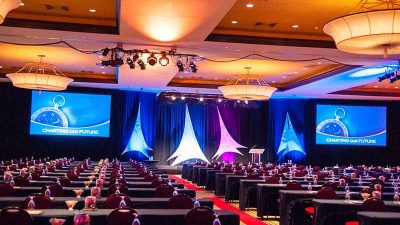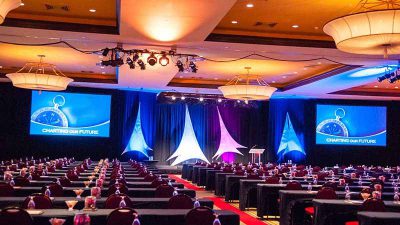Meetings and Events See 2021 Rebound
Research from PredictHQ forecasts uneven recovery for hotels and event venues in the months ahead
August 23, 2021


The hospitality industry across the US and the world could see a robust but unevenly distributed recovery this year, according a detailed analysis of hundreds of thousands of events from PredictHQ, a company which provides demand forecasts for global organizations.
The report, entitled “Demand Impact Report: The Great Hospitality Recovery of 2021,” analyzes the return of the types of live events that have the biggest effect on the hospitality industry as cities reopen and events are rescheduled.
The topline results show a steady and accelerating recovery for the hospitality industry, but one that is not evenly distributed across major markets, with destinations like Las Vegas and Austin nearing 2019 levels, while San Francisco and New York lag.
“We expect hotels and accommodations to see big surges in customer demand in September as more large events are rescheduled,” said Campbell Brown, CEO at PredictHQ. “Recovery varies widely by city, state and country due to COVID-19 rates and restrictions, and our data shows the hospitality industry can expect fluctuating degrees of demand by location.”
Key results from the PredictHQ analysis cross the United States show:
- Hospitality demand drivers hitting over 77 percent of 2019 levels at the September 2021 peak. This recovery at a national level suggests not just a “return to normal” on the horizon, but potentially an even more robust recovery in 2022.
- Even though the full year’s event attendance recovery for 2021 stands at only 37 percent of 2019, more than 193 million people are expected to attend accommodation-scale events in the back half of this year, a 53 percent recovery towards 2019 levels, with still more time for events to be rescheduled and push than number even higher.
Statistics in five key markets illustrate the uneven nature of recovery from July onward:
- Austin – 94 percent recovered: From a standing start near zero through April, the Texas capital returned to something close to normal from May to August, before a giant spike in September and October. With the upcoming United States Grand Prix, combined with all the surrounding Formula 1 events, the city of Austin is likely to see well over 1.25 million potential accommodations guests.
- Las Vegas – 77 percent recovered: With the opening of its convention center expansion, the second half of the year looks so strong for Las Vegas that it will surpass its 2019 accommodation demand trend line not once, but twice. Magic Las Vegas and Las Vegas Market are expected to draw 102,000 combined, and in October EDC, NAB and the Summerlin Festival of the Arts will attract an expected 467,000 in attendance.
- Los Angeles – 52 percent recovered: While Los Angeles struggles with a rise in COVID-19 case numbers and is actively reinstituting some COVID restrictions, there are still plenty of reasons Los Angeles may yet be a bright spot for the US accommodations industry. From July on, the data shows LA is at 52 percent of 2019 levels.
- New York – 49 percent recovered: In one of the steadiest recoveries seen in any market, New York consistently closes the accommodations demand gap from April through to September, culminating in the US Open in late August through mid-September, expected to draw 700,000 attendees, and NY Fashion Week Sept 8-12 with 120,000 attendees and $132 million in accommodation income alone.
- San Francisco – 27 percent recovered: One of the only cities where event attendance dropped to single-digits (6 percent) during 2020, the overall recovery picture trails behind the rest of the US, with San Francisco expecting 27 percent of 2019 event-driven accommodation demand. However, smaller events, particularly sports-related, are coming back.
The PredictHQ forecasts are reflected in recent results from the hospitality industry. Top executives at major hotel chains have been bullish on a stronger than expected revival in group travel heading into the second half of 2021, with bookings into next year continuing to post positive gains.
“There is no playbook for navigating recovery following a global pandemic, and without sophisticated data modeling that blends a full spectrum of real-time signals, businesses are flying blind,” Brown said. “That’s why it’s critical for industries to get accurate, predictive data on live events, which have a tremendous impact on consumer demand.”




